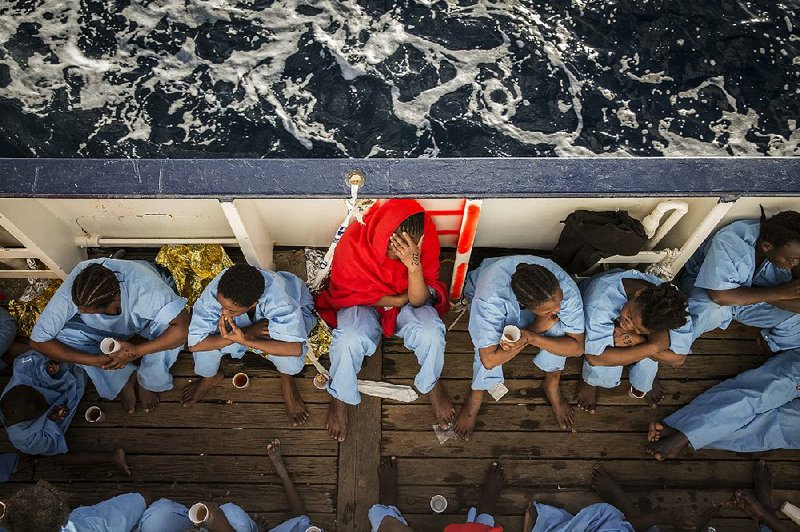VALLETTA, Malta -- Tens of thousands of people are expected to trek across deserts and board unseaworthy boats in war-torn Libya this year in a desperate effort to reach European shores by way of Italy.
More than 181,000 people, most of them so-called economic migrants with little chance of being allowed to stay in Europe, attempted to cross the central Mediterranean last year from Libya, Africa's nearest stretch of coast to Italy. About 4,500 died or disappeared.
Hundreds have already taken to the sea this month, braving the winter weather. In the latest reminder of the journey's perils, more than 100 people were missing off Libya's coast over the weekend after a migrant boat sunk.
Italy's coast guard said only four people survived the sinking and eight bodies have been recovered.
Farther west, Spain's maritime rescue service said the bodies of seven African migrants had been found dead along the Strait of Gibraltar since Friday.
In his noon blessing, Pope Francis recalled that the theme of the church's World Day of Migrants celebrated Sunday concerned the particular vulnerability of young migrants -- "our young brothers" who often flee home alone and face "so many dangers."
"We must adopt every possible measure to guarantee young migrants protection and defense, as well as integration," he said.
The U.N. refugee agency has reported a sharp increase in the number of unaccompanied minors reaching Italy: 25,846 last year, more than double the previous year. Aid groups say if these young people survive the crossing, they are particularly vulnerable to exploitation and abuse by land-based traffickers once they reach Europe.
Some European leaders are warning of a fresh migration crisis when sea waters warm again and more people choose to put their lives in the hands of smugglers.
"Come next spring, the number of people crossing over the Mediterranean will reach record levels," Malta Prime Minister Joseph Muscat, whose country holds the European Union's presidency, predicted. "The choice is trying to do something now, or meeting urgently in April, May ... and try to do a deal then."
The 28-nation EU already has a deal to stem the flow of migrants from Turkey, which has agreed to try to stop the number of migrants leaving the country and to take back thousands more. In exchange, Turkey is supposed to receive billions of euros, visa-free travel for its citizens and fast-tracked EU membership talks.
Now, the EU wants to adapt this outsourcing pact to the African nations that migrants are leaving for Europe, despite criticism that the agreement sends asylum-seekers back to countries that could be unsafe for them.
Chad, Ethiopia, Mali, Mauritania, Niger and Nigeria are all on the EU's radar, and dealing with them is proving expensive. But the bloc's arrangement with Turkey has shown that the best way of stemming migrant flows is to stop people taking to the sea. Libya and Egypt are the main migrant departure points, and pacts with them would probably have the biggest immediate impact.
Muscat wants to build on a deal Italy is trying to reach with Libya by adding EU funds and other support. He also thinks the EU's anti-smuggler naval mission, Operation Sophia, should be extended into Libyan territorial waters to stop people in unsafe boats from reaching open water.
The EU has been unable to secure United Nations backing for such a move, and Libya has no central authority with the reach or stability to negotiate a long-term agreement with the Europeans.
Libya's neighbor Egypt appears a more viable option. Many people have set out for Europe from Egypt in recent months, mainly migrants from the Horn of Africa trying to avoid dangerous Libya and increasingly Egyptians themselves, according to the EU's border agency Frontex.
Information for this article was contributed by Lorne Cook and Nicole Winfield of The Associated Press.
A Section on 01/16/2017

